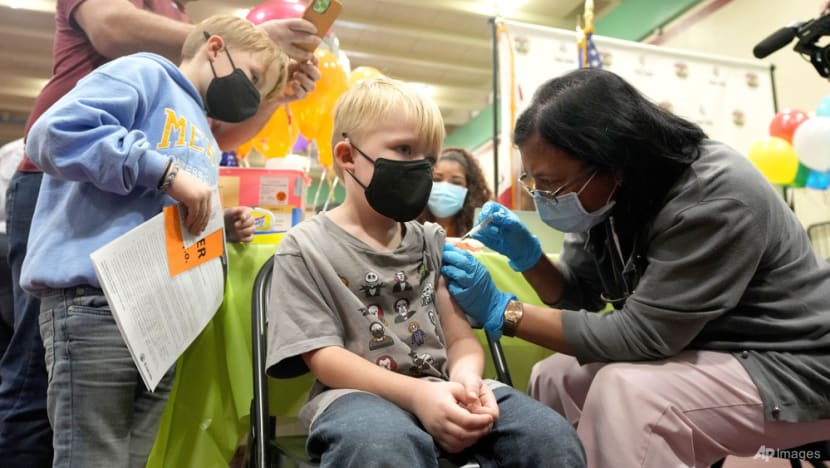Commentary: Parental concerns brewing ahead of approval for COVID-19 vaccinations for kids under 12
Parents are already thinking whether to vaccinate younger children aged five to 11, and we need to have this conversation, says NUH paediatrician Dr Lee Le Ye.

A COVID-19 vaccination centre for students on Jun 3, 2021. (Photo: Facebook/Ministry of Education)
SINGAPORE: Parents in Singapore with kids aged five to 11 will have to make a big decision very soon.
The Health Ministry’s director of medical services Kenneth Mak said on Saturday (Nov 20) that Singapore hopes to extend COVID-19 vaccines for children aged five to 11 from January 2022, pending the recommendation of the Expert Committee on COVID-19 Vaccination.
As a mother, I can understand the conflicts and concerns that parents have. Choosing to get that jab for our young ones just doesn’t seem straightforward.
On one hand, we celebrate that a vaccine is finally available for children as we know mass vaccination of the world population is our ticket out of the pandemic. Most of Singapore’s eligible population have been fully vaccinated against COVID-19.
And we are fortunate many effective COVID-19 vaccines have been produced and authorised for use in record time, and made available to us in Singapore. Many countries, especially in less developed countries, still have issues accessing these life-saving vaccines.
Many countries have also launched successful vaccination campaigns, including for adolescents after published clinical trial data demonstrated vaccine efficacy at preventing symptomatic infection in children aged 12 to 15.
Several also rolled out or recommended vaccinating younger age groups or are currently deliberating it. In the United States, more than 2.6 million children between five to 11 have already received their first dose.
Parents in Singapore who may have eagerly taken their own shots didn’t seem to hesitate when vaccinating their children above 12 years of age. As of Nov 23, 85 per cent of our total population are fully vaccinated - one of the highest worldwide - especially with about 90 per cent among youths and young adults.
Will we do the same with younger children when the time comes?

CONTENDING WITH POSSIBLE SIDE EFFECTS AND RISKS
On the other hand, many parents can’t help but wonder whether the vaccine is safe. With no long-term data on the effects of vaccines, parents are concerned about possible side effects.
These are unknowns that can only be addressed after real-world vaccination programmes are established. These are known as Phase 4 data used in all medicines and vaccines developed previously.
Besides allergic reactions which manifest within the study period, there is particular concern about the increased risk of myocarditis or pericarditis. To date, the incidence of myocarditis appears to be higher in adolescent and young adult males.
But Singapore data has shown low rates of serious adverse events – about 0.006 per cent of almost 10 million doses administered as of Oct 31 according to the Health Sciences Authority.
Parents might also have to contend with the practical challenge of limiting young energetic children’s activities and physical movements for two weeks after vaccination – not an easy feat.
On top of that, younger children will naturally be afraid of vaccination and needles. Parents may find it more difficult to manage children who have yet to reach the maturity to understand the need and rationale for the vaccine.
WEIGHING THE RISKS AND BENEFITS
But parents are also savvy enough not to think of risks in isolation. Are the benefits of vaccination worth its risks? Don’t children have a lower risk of developing severe disease?
Have a niggling fear despite clinical trials showing good outcomes for children aged five to 11? Listen to health experts and a mother weigh in on CNA's Heart of the Matter?
In high Human Development Index (HDI) countries, the risk of severe COVID-19 in children and adolescents is low, with a mortality of 1 to 2 per million population – or similar to seasonal influenza, which we provide to children older than six months.
But it would be oversimplified to say children can get infected with little consequence.
Risk of severe disease depends on individual risk factors. Within the paediatric age group, apart from infants, the greatest risk factor for severe COVID-19 or death is underlying medical conditions including obesity, chronic lung disease and neurologic disease.
Specifically, among adolescents hospitalised for COVID-19 in the US, 70.6 per cent had at least one underlying medical condition.
Vaccinating children who are vulnerable and with underlying medical conditions will certainly help reduce their own risk of severe illness and deaths.
Another major concern is the multi-system inflammatory syndrome in children (MIS-C) linked to COVID-19, as well as the risk of long-COVID.
Singapore has recently experienced its second wave of COVID-19, and children have not been spared from infection, with at least 1,732 cases in children below 12 from Nov 9 to 15.
However, there are low numbers of children who require oxygen, intensive care or intubation. It is fortunate no child or adolescent in Singapore has died due to COVID-19 to date.
Vaccinating children helps to reduce the possibility of symptomatic disease - as the vaccine has high efficacy of 90.7 per cent - and assuage parents’ anxieties about children’s participation in schools, extra-curricular activities and after-school activities like tuition.
It can lower the extent of transmission as well as the possibility of infection for both adults and children. Isolating young children alone for home recovery will be challenging and a caregiver will need to be available.
Reducing infection in children can also reduce the risks of them infecting their grandparents or parents who are unable to take the vaccines due to other underlying conditions like cancer treatment or severe allergies.
CONSIDER THE MOST VULNERABLE CHILDREN
In a way, Singapore and many parents have already adopted a cocoon strategy to protect our little ones – parents, older siblings, childcare teachers, pregnant women as well as lactating women are getting vaccinated.
Studies conducted at the National University Hospital have shown vaccinated mothers transfer protective antibody to their babies during pregnancy as well as after delivery through breastmilk. In COVID-19 infected mothers, vaccination also reduces the risks of some pregnancy complications, and of mother-to-baby transmission during pregnancy, at or after delivery.
A recent United Kingdom study published in The Lancet Infectious Diseases journal also found that vaccination helps to reduce household transmission of the Delta variant, allows quicker clearance of infections, and shortens the duration of viral shedding which reduces exposure for children in the household.
Parents can also consider vaccinating the most vulnerable children first, such as those with underlying respiratory and cardiac issues, immunocompromised children, and certainly children of healthcare professionals or frontliners.
It is also worth vaccinating children living with immunocompromised household members at higher risk of life-threatening COVID-19.
Parents whose children have yet to complete their basic childhood immunisation due to disruptions like last year’s circuit breaker should complete them first.
Only then will they be able to make sound decisions to protect their families and give our children a chance to return to the playgrounds and group activities.
Dr Lee Le Ye is Senior Consultant, Department of Neonatology, Khoo Teck Puat – National University Children’s Medical Institute, National University Hospital, and Assistant Professor, Department of Paediatrics, NUS Yong Loo Lin School of Medicine.




















